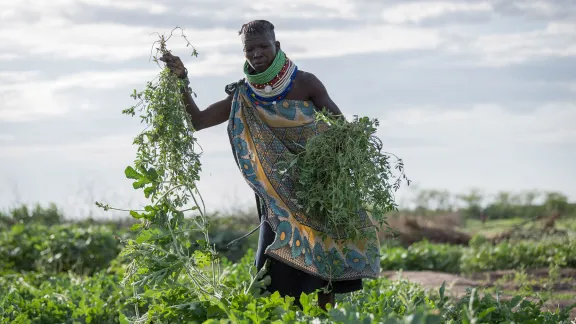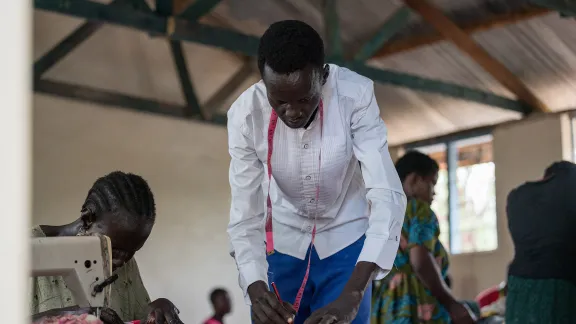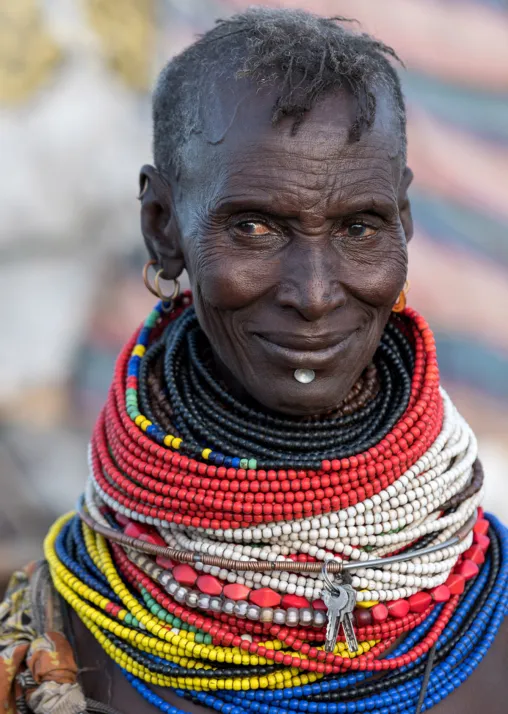"Hope away from home” is the theme of World Refugee Day 2023. In this story, we share how LWF helps refugees and their host community gain new livelihoods in Kenya.

Women from the Turkana community at Nakoyo pull weeds as they work at the Nakoyo farm. Photo: LWF/ Albin Hillert
World Refugee Day 2023 celebrates “Hope away from home”
(LWI) - 110 million people who were forced to leave their homes because of conflict and natural disaster: This is the sad record of worldwide displacement numbers announced by the UN refugee agency UNHCR on the occasion of World Refugee Day 2022. As many conflicts turn into protracted crises, this year’s theme is “Hope away from home. A world where refugees are always included.”
Livelihoods work is an important part of The Lutheran World Federation’s (LWF) work with refugees and host communities in many countries.
LWF is the longest serving and biggest implementing partner for UNHCR in Kakuma refugee camp, Kenya. Kakuma has become a home to more than 200,000 people from various countries. LWF provides education, vocational training and livelihood support.
In the refugee camp here, we have food shortages and poor livelihoods, so I see this as a way for me to become self-employed and able to sustain a family.
– Bona BOL, tailor-in-training, Kakuma refugee camp
Hard working refugees aim at vocational certificates, business
For Bona Bol – a 28-year-old refugee from South Sudan – the way that the LWF engages in building the capacity of the refugees towards self-reliance, is making a direct impact.
Bol participates in an LWF vocational training programme entitled Bidii (‘hard working’) and is in his fourth month towards becoming a tailor. Upon completion of the training, he and his fellow students will try for a national certificate allowing them to start a business.
“In the refugee camp here, we have food shortages and poor livelihoods, so I see this as a way for me to become self-employed and able to sustain a family,” Bol says.

28-year-old Bona Bol takes measurements together with his fellow student Anyer Arok – both from South Sudan. Photo: LWF/ Albin Hillert
But for Bol, undergoing training is about more than just his own future: “My hope is to build a social enterprise with refugees here in Kakuma. People here don’t know how to start their own businesses. This is why I am here, to help a good number of refugees,” he says.
Host community sees opportunities, despite climate challenges and refugee influx
In Nakoyo, not far from the Kakuma refugee camp, sits a small farm consisting of a few acres of land and a set of net houses used to grow a variety of different crops.
A project of the LWF, the farm serves as a training ground for 83 individuals from the Turkana people – a traditionally pastoralist people native to the area, and host community for Kakuma refugee camp and the related Kalobeyei refugee settlement.
“This is one of four similar farms around the refugee camp. We help the Turkana community develop small-scale farming to diversify their sources of income, as changes in climate and extended droughts have made keeping of livestock more difficult,” explains LWF livelihoods officer Hilda Thuo. “The animals simply do not survive as they used to.”
And while the project at Nakoyo targets a limited number of individuals, it has the potential to reach an extended population of at least 1,000 Turkana households in the area. “Today they grow spinach, cowpeas, groundnut, watermelon, sorghum, butternut and other crops here,” Thuo adds looking out over the fields.
One who says she has always lived in the area, including before refugees even began arriving in Kakuma, is Turkana elder Lokarach Lomongin.

Community elder Lokarach Lomongin pictured in Nakoyo. Photo: LWF/ Albin Hillert
Although the arrival of hundreds of thousands of refugees has meant new realities in terms of land and availability of space, Lomongin says she sees many benefits.
“The establishment of the camps has actually helped our communities, through improved living conditions, and the types of food and seeds that are now available,” she reflects. The Nakoyo farm has improved the community’s provision of vegetables, and helped against malnutrition.
As the day draws to a close and the community moves from the farm back to their homes in the late afternoon, it is time for a moment of rest and a meal before night falls. “Tonight we are eating cowpeas, which we have picked from the farm,” Lomongin says.

As the workday comes to an end at sunset at the farm in Nakoyo, the group of Turkana walk back to their homes for a moment of rest and some food before nightfall. Photo: LWF/ Albin Hillert
Every year on 20 June, the world celebrates the resilience and resourcefulness of refugees and internally displaced people, while raising awareness about the increasing numbers of forcibly displaced people. This year’s theme focuses on solutions for refugees and the power of inclusion: “Hope away from home. A world where refugees are always included.”
LWF, through its humanitarian and development arm World Service, supports 3.4 million people in need, in 28 countries in Africa, Asia, Europe, the Middle East and Latin America. On social media, we will share more stories of hope for those who had to flee.


